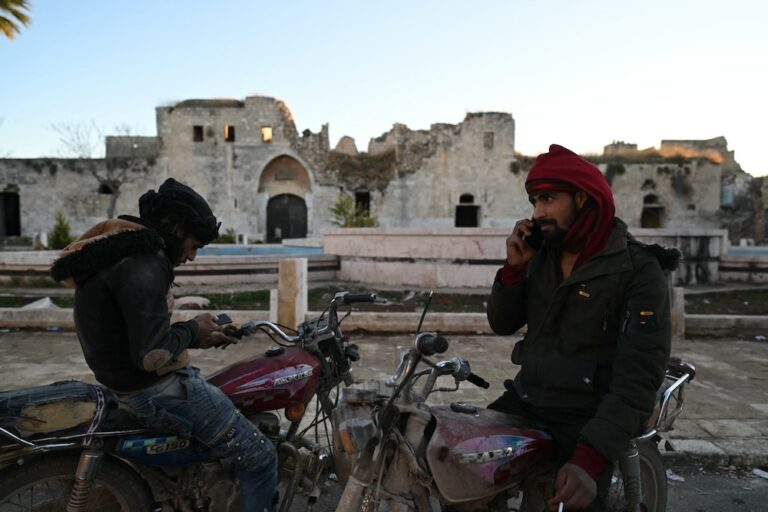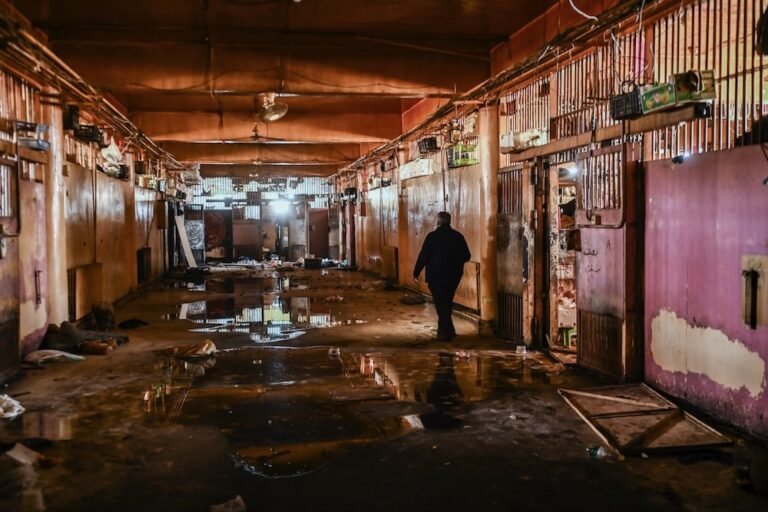(HRW/IFEX) – Human Rights Watch on 15 September 1998 called for urgent action to save the life of imprisoned Syrian dissident Nizar Nayouf, a 36-year-old writer and human rights activist suffering from Hodgkin’s disease in a Damascus military prison. **For background, see IFEX alert of 10 September 1998** “We are deeply concerned that Nizar Nayouf […]
(HRW/IFEX) – Human Rights Watch on 15 September 1998 called for urgent
action to save the life of imprisoned Syrian dissident Nizar Nayouf, a
36-year-old writer and human rights activist suffering from Hodgkin’s
disease in a Damascus military prison.
**For background, see IFEX alert of 10 September 1998**
“We are deeply concerned that Nizar Nayouf is being denied medical treatment
until he pledges to cease all political activity and signs an admission that
he
made false declarations concerning the situation of human rights in Syria,”
said
Hanny Megally, executive director of the Middle East and North Africa
division of Human Rights Watch. In a letter to Damascus-based foreign
diplomats
made public today, Human Rights Watch called on them to raise Nayouf’s case
at
the highest levels of the Syrian government, and press for immediate
treatment and release on humanitarian grounds. Human Rights Watch also
recommended that the diplomats request access to Nayouf in prison, as a
signal of concern
about his case. The organization contacted Syrian president Hafez al-Asad
about the case on September 11.
“Time is of the essence,” Megally added. “Nizar Nayouf shouldn’t be in
prison in
the first place. He has been tortured, unfairly tried, and held in solitary
confinement for many years. Now, in perhaps the ultimate injustice, he is
being forced to choose between his principles and his health, and quite
possibly his life. Such coercion is unacceptable. We are calling on
diplomats in
Damascus to insist that Nizar Nayouf immediately receive medical care
without
conditions attached. This man should not be allowed to die in prison.”
Nayouf was arrested in January 1992, following a government crackdown on
Syria’s nascent human rights movement that began with the arrest of
activists in
December 1991. Authorities held Nayouf’s wife and baby daughter hostage to
induce him to turn himself in. He was tortured in detention, which has left
him
with permanent physical injuries. The Supreme State Security Court sentenced
Nayouf to ten years in prison in March 1992, following an unfair trial. He
has
been held in solitary confinement under punishing conditions at Mezze
military
prison in Damascus.
Trained at the University of Damascus as a political economist, Nayouf was a
founding member of the independent Committees for the Defense of Democratic
Freedoms and Human Rights in Syria. He has authored three volumes of poetry,
including “A Pipe for Smoking Dreams,” a collection of political poems.
Since
his imprisonment, he has received international human rights awards,
including
the prestigious Hellman/Hammett Grant and a Freedom-to-Write Award from
PEN American Center.
A photograph of Nizar Nayouf is available through Human Rights Watch.
The full text of the letter to French ambassador Charles de Dancalis de
Maurel d’Argon is attached. Similar letters were sent to ambassadors in
Damascus from
the following countries: Austria, Belgium, Canada, Denmark, Finland,
Germany,
Greece, Italy, the Netherlands, Norway, Portugal, Spain, Sweden, the United
Kingdom, and the United States.
BY FACSIMILE
14 September 1998
His Excellency Charles de Dancalis de Maurel d’Argon
Ambassador
Embassy of France
Damascus, Syria
Dear Ambassador de Dancalis de Maurel d’Argon:
I am writing as an urgent matter to request that you raise with Syrian
authorities at the highest levels the case of Nizar Nayouf, a
thirty-six-year-old Syrian writer and human rights activist who is currently
serving a ten-year prison sentence at Mezze military prison in Damascus.
According to information made public last week by Reporters Sans Frontieres,
Mr. Nayouf is suffering from Hodgkin’s disease, but has been denied the
medical treatment required to save his life until he agrees to refrain from
political activity and admit that he made “false declarations concerning
the situation of human rights in Syria.” Human Rights Watch wrote to
President Hafez al-Asad on September 11, appealing for the immediate
investigation and remedy of Nizar Nayouf’s situation. A copy of this letter
is attached.
We have long campaigned for the release of Syrian prisoners, including Mr.
Nayouf, who have been sentenced to long terms by the Supreme State Security
Court solely because they exercised the right to freedom of expression and
freedom association. We have documented and publicly criticized practices of
the court which have not met international fair trial standards, such as the
trial in 1992 that resulted in the lengthy imprisonment of Nizar Nayouf and
other human rights activists affiliated with the independent Committees for
the
Defense of Democratic Freedoms and Human Rights in Syria (CDF). As you
are no doubt aware, the government effectively crushed this nascent network
between December 1991 and March 1992.
Nizar Nayouf graduated from the University of Damascus in 1986 with a
degree in political economy, and earned a master’s degree in economic
development from the same institution in 1987. He was a founding member of
CDF and, according to many Syrians interviewed by Human Rights Watch, was a
driving force behind the organization and a strong advocate that CDF
maintain its independence from various unauthorized political parties. At
the time of his arrest in 1992, he was working on his doctoral dissertation,
“Capital Evolution and Dependent Production in Syria, 1838-1963.” He also
published three volumes of
poetry, including “A Pipe for Smoking Dreams,” a collection of political
poems.
In 1996, Human Rights Watch wrote to President Asad about Mr. Nayouf’s
prolonged solitary confinement in Mezze prison, and urged his transfer to a
civilian prison.
This letter, a copy of which is attached, went unanswered.
Nizar Nayouf should never have been imprisoned, and it is a tragedy that
he is now forced to confront a life-threatening illness from behind the bars
of
a solitary cell in a military prison. Human Rights Watch appeals to you, and
to
other members of the diplomatic community in Damascus, to raise his case
urgently with Syrian government officials and to press as vigorously as
possible
for the immediate provision of the necessary medical treatment and his
release
on humanitarian grounds. We also strongly recommend that your embassy
request access to Mr. Nayouf, without delay. Such an initiative, we believe,
would send an important signal of concern to Syrian authorities.
We trust that you will respond to our appeal and take the appropriate action
at the earliest possible moment. Nizar Nayouf’s situation appears to be
quite grave, and time is of the essence. Thank you in advance for your
consideration of this most serious matter, and please do not hesitate to
contact us there is any additional information that you require.
Sincerely,
Hanny Megally
Executive Director
Middle East and North Africa Division
Human Rights Watch


